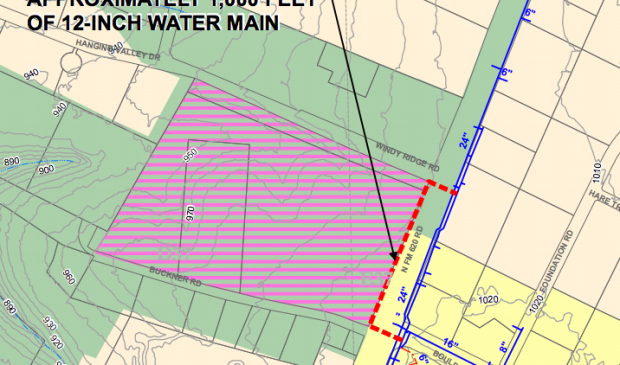Service extension may signal city’s growth plans
Monday, September 8, 2014 by
Tyler Whitson In a move that may signal the city’s future growth plans, City Council has postponed decisions on whether to grant water and wastewater service extension requests for the Stokes Ranch development in the city’s Limited Purpose jurisdiction. Watershed Protection Department staff recommended Council deny the requests.
Council voted 6-0 at its regular meeting last Thursday to reconsider the items on Sept. 25. In the meantime, it requested that Watershed Protection staff perform further evaluation to determine whether centralized service would be more environmentally sensitive than an on-site septic system. Council Member Bill Spelman was not present for the vote.
Environmental Officer Chuck Lesniak told the Monitor on Wednesday that they could recommend the extension requests, if his department determines that the negative potential impacts of constructing and providing on-site water supply and wastewater treatment outweigh those of centralized service.
The 25.5 acre tract in question is located on the northwest corner of Ranch Road 620 and Buckner Road. It falls not only within the city’s Limited Purpose jurisdiction, but within its Drinking Water Protection Zone, the Lake Travis Watershed and Austin Water Utility’s service area. The applicant, HTK 620 L.L.C., plans to construct 36 single-family condominium units, restaurant and retail space on the property.
Watershed Protection staff had previously released a memo stating “the extension of service would increase development in an environmentally sensitive area.”
Lesniak explained to Council that the applicant could construct more units on the property with service extensions than with on-site alternatives, which would require the applicant to reduce the number of units on the property, but potentially maintain the same amount of impervious ground cover.
Lesniak also elaborated on the staff’s decision not to recommend granting the requests. “As a rule of thumb,” he said, “we don’t recommend service extension requests unless there’s some sort of overriding environmental benefit.”
Mayor Lee Leffingwell expressed skepticism about the alternative options. “I just really find it hard to believe that having septic systems on this property serve the same amount of impervious cover is more environmentally sensitive than having a central sewer system,” he said.
Council Member Kathie Tovo, who made the motion, pointed out that the Environmental Board and the Water and Wastewater Commission had recommended approving the extension requests.
Attorney Jeff Howard of McLean Howard, LLP was representing the developer. He expressed disagreement with the Watershed Protection Department’s recommendation. “There are very definitely alternatives to the service extension requests,” Howard said, “but they’re not necessarily good alternatives, either for the applicant, the utility or the environment.”
Council also discussed the impact the city’s potential future full annexation of the land has on the issue.
Lesniak told Council that the Planning and Development Review Department, which determines if and when land will be annexed, had stated the property in question is not in its “near-term annexation plans.” He added, “Once it looks like development is about to happen, it may show up in the out years.”
Limited purpose annexation requires that jurisdictions adhere to land development, environmental and sometimes additional city ordinances, though the city does not collect taxes from those residents and does not provide them with municipal services.
Leffingwell said, “Obviously, if it’s in limited jurisdiction right now, there’s some plan that it will be annexed in the future.” He added that “there is obviously development planned at this point.”
Lesniak confirmed the city would be responsible for providing water and wastewater services if the land were to be fully annexed in the future.
Lesniak told the Monitor that, while these types of requests are not very common, “there are a lot of issues associated with them.” In addition to environmental concerns, he said, the requests are associated with where the city is “encouraging development and not encouraging development.”
The city has the option to approve or deny requests from applicants for properties outside of its regular jurisdiction, but within its extraterritorial and limited-purpose jurisdictions. However, Lesniak pointed out, Texas Local Government Code 212.174 does not allow municipalities to condition the provision of these utilities. “They can’t work out an agreement with the developer, saying, ‘If you’ll do this, we’ll provide you with utility service.'”
Lesniak said he believes “the development community would be open to the legislature making some changes there.”
“We regularly have developers or property owners come to us asking for … water and wastewater service out in our extraterritorial jurisdiction, and they say, ‘You know what, I will make this an environmentally better project — go above and beyond the regulatory minimums — if the city will provide me service,'” Lesniak said. “Every time I have to say, ‘I’m sorry, I have to review the application based on the regulatory minimums because I can’t require you to do anything beyond that.'”
You're a community leader
And we’re honored you look to us for serious, in-depth news. You know a strong community needs local and dedicated watchdog reporting. We’re here for you and that won’t change. Now will you take the powerful next step and support our nonprofit news organization?






